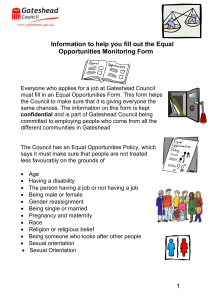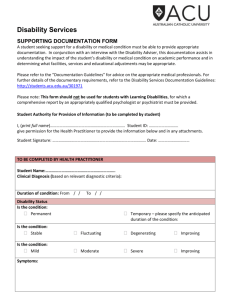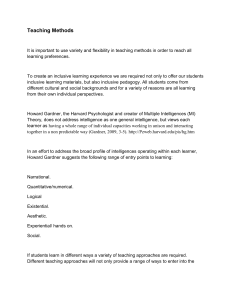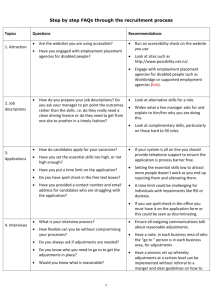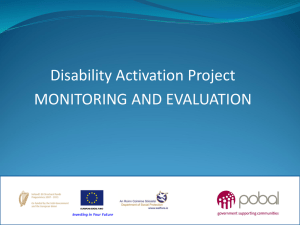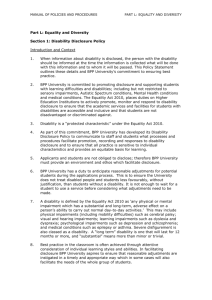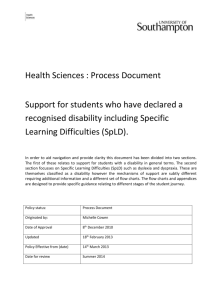The past, present and future - A perspective from Professor Dennis
advertisement
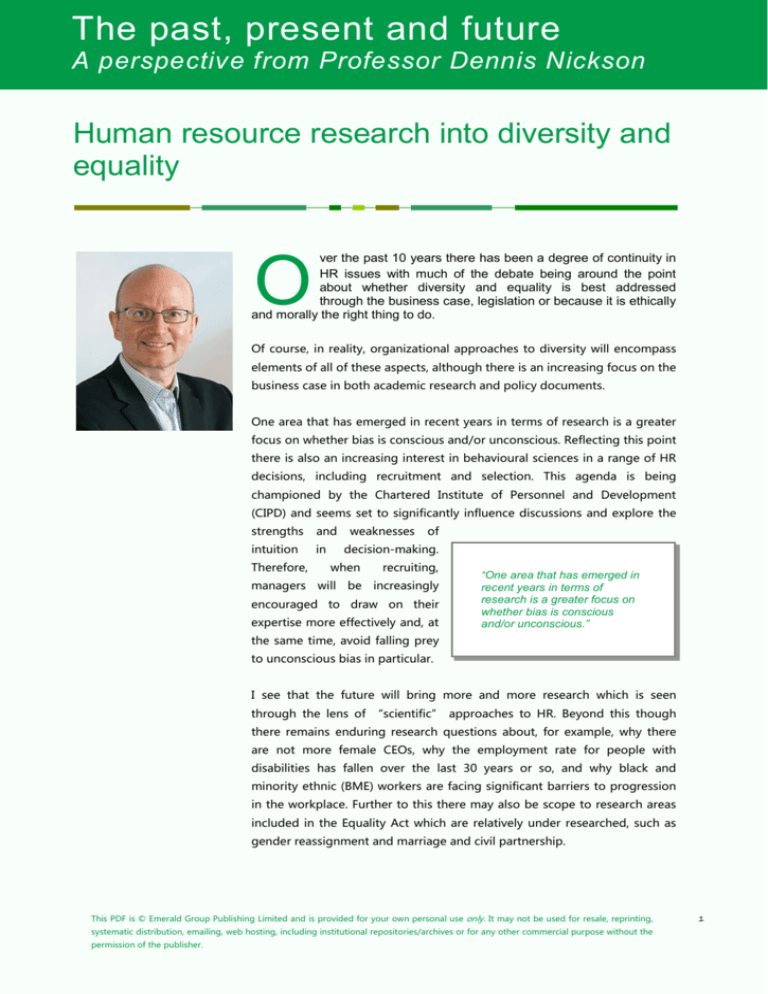
The past, present and future A perspective from Professor Dennis Nickson Human resource research into diversity and equality ver the past 10 years there has been a degree of continuity in HR issues with much of the debate being around the point about whether diversity and equality is best addressed through the business case, legislation or because it is ethically and morally the right thing to do. O Of course, in reality, organizational approaches to diversity will encompass elements of all of these aspects, although there is an increasing focus on the business case in both academic research and policy documents. One area that has emerged in recent years in terms of research is a greater focus on whether bias is conscious and/or unconscious. Reflecting this point there is also an increasing interest in behavioural sciences in a range of HR decisions, including recruitment and selection. This agenda is being championed by the Chartered Institute of Personnel and Development (CIPD) and seems set to significantly influence discussions and explore the strengths and intuition in Therefore, managers weaknesses of decision-making. when will be recruiting, increasingly encouraged to draw on their expertise more effectively and, at “One area that has emerged in recent years in terms of research is a greater focus on whether bias is conscious and/or unconscious.” the same time, avoid falling prey to unconscious bias in particular. I see that the future will bring more and more research which is seen through the lens of “scientific” approaches to HR. Beyond this though there remains enduring research questions about, for example, why there are not more female CEOs, why the employment rate for people with disabilities has fallen over the last 30 years or so, and why black and minority ethnic (BME) workers are facing significant barriers to progression in the workplace. Further to this there may also be scope to research areas included in the Equality Act which are relatively under researched, such as gender reassignment and marriage and civil partnership. This PDF is © Emerald Group Publishing Limited and is provided for your own personal use only. It may not be used for resale, reprinting, systematic distribution, emailing, web hosting, including institutional repositories/archives or for any other commercial purpose without the permission of the publisher. 1 Right now though there is a real need for employers to consciously avoid negative stereotypes and it is “I see that the future will bring more and more research which is seen through the lens of “scientific” approaches to HR.” suggested that employers often have a greater bias against people with disabilities compared to other groups in the workplace. Whilst there has been some progress, not least by including disability as part of anti-discrimination legislation in 1995, there still remain many challenges. Recent research reported by the CIPD found that 74 per cent of disabled candidates would not declare their disability for fear of not getting a job. Relatedly, the same research also found that over 75 per cent of disabled candidates stated that the lack of disability awareness was the most significant barrier in recruitment. Surveys regularly report that diversity and inclusion seems to be a key policy area for organizations, with the vast majority having a written policy or set of guidelines. Often as well these policies/guidelines cover the majority of protected characteristics included in the Equality Act 2010. However, translating policy into actions can be challenging. Thus, whilst there are clearly many examples of good practice, equally there remain a number of challenges for organizations before they can truly say they are practicing equality of opportunity for all. One such example is the notion of “reasonable adjustments”, which is crucial in highlighting how employers, taking into account their size and resources, should still be prepared to think broadly about what “Surveys regularly report that diversity and inclusion seems to be a key policy area for organizations, with the vast majority having a written policy or set of guidelines.” denotes reasonable adjustments to enable people with disabilities to access employment. Reasonable adjustments which could be made to accommodate disability include: • Allowing absence for rehabilitation and treatment • Altering a person’s working hours • Acquiring or modifying equipment • Adjusting premises • Transferring a person to another job • Assigning a person to other work • Providing a reader and interpreter • Providing support workers This PDF is © Emerald Group Publishing Limited and is provided for your own personal use only. It may not be used for resale, reprinting, systematic distribution, emailing, web hosting, including institutional repositories/archives or for any other commercial purpose without the permission of the publisher. 2 • Modifying instruction manuals. Often these adjustments can be made at a relatively low cost and it is important that “Often these adjustments can be made at a relatively low cost and it is important that employers work proactively with employees with a disability to address this issue.” employers work proactively with employees with a disability to address this issue. Indeed, in the previously mentioned CIPD research nearly half of the disabled candidates seeking employment found a lack of support from employers in considering reasonable adjustments. About Professor Dennis Nickson Dennis is Professor of Service Work and Employment in the Department of Human Resource Management at the University of Strathclyde and an Academic Fellow of the Chartered Institute of Personnel and Development (Academic FCIPD). Dennis’ primary research interests centre on work and employment issues in interactive service work, with a particular concentration on the retail and hospitality industries. He has featured as a “Professor to Watch” in the Financial Times and contributes to policy change, one example includes chairing a one-day conference on Welfare Reform in Scotland in 2011, with speeches from the UK Minister for Welfare Reform and the Scottish Government’s Minister for Skills and Lifelong Learning. He is Editor-in-Chief of Emerald journal Employee Relations, a leading international academic journal focusing on the importance of understanding employment and HR challenges and debates within the context of contemporary national and international labour markets. This PDF is © Emerald Group Publishing Limited and is provided for your own personal use only. It may not be used for resale, reprinting, systematic distribution, emailing, web hosting, including institutional repositories/archives or for any other commercial purpose without the permission of the publisher. 3

